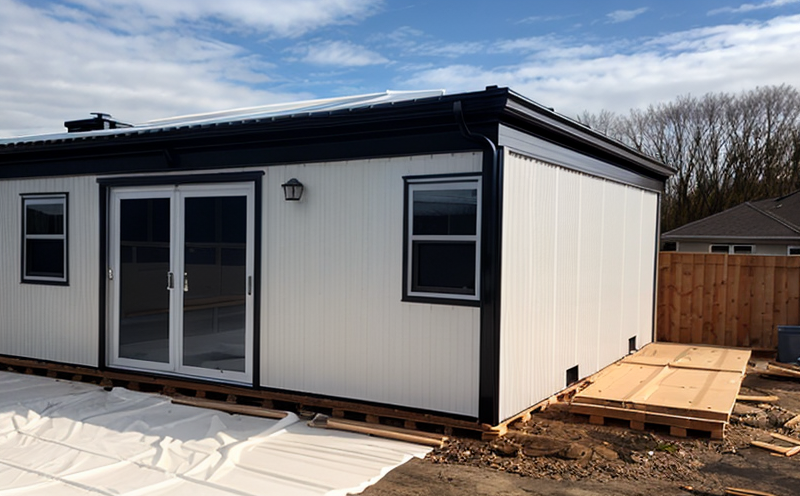EN 13830-1 Curtain Wall Structural Testing
The EN 13830 series of standards provides a comprehensive framework for testing and assessing the structural performance, durability, and weather resistance of curtain walls. This service focuses on EN 13830-1 specifically, which details the structural testing procedures for curtain walls. Curtain walls are integral components in modern building envelopes designed to provide thermal insulation, acoustic protection, and aesthetic appeal while ensuring structural integrity.
The standard is particularly relevant for buildings that experience significant wind loads or seismic activity, where the integrity of the curtain wall's structure can significantly impact the overall safety and durability of the facility. This service ensures compliance with international standards to meet both local building codes and global market requirements.
EN 13830-1 stipulates that testing must be conducted on full-scale or scaled-down specimens, depending on practicality and cost-effectiveness. The structural integrity test involves applying a defined wind load over the curtain wall specimen to simulate real-world conditions. This process is critical for verifying the design loads specified in the structural calculations.
The testing setup typically includes a loading frame capable of simulating various wind velocities and angles, ensuring that all components of the curtain wall—such as anchors, connectors, and joints—are subjected to appropriate stress levels. The specimen is carefully prepared to replicate actual construction details, including any proprietary or custom materials used in the design.
During testing, continuous monitoring devices measure displacement, strain, and force at multiple points along the curtain wall. This data helps engineers assess not only the immediate structural performance but also the long-term durability of the system under repeated loading cycles. The test concludes with a detailed report that outlines the results, including any deviations from expected behavior or design specifications.
The results of EN 13830-1 testing are crucial for architects, engineers, and quality managers involved in the design and construction phases of commercial and residential buildings. Compliance with this standard ensures that curtain walls meet stringent safety requirements, which is particularly important for tall buildings where even minor structural deficiencies could lead to catastrophic failure.
The service also supports research and development efforts by providing accurate data on material performance under various conditions. This information can be used to improve design methodologies or introduce new materials into the market. Furthermore, it assists in maintaining compliance with evolving building codes and regulations across different jurisdictions.
By adhering to EN 13830-1 standards during testing, clients gain confidence that their products meet international quality benchmarks. This can enhance their reputation among customers and stakeholders, fostering greater trust within the industry. Additionally, successful completion of these tests demonstrates commitment to safety and sustainability principles, which are increasingly valued by environmentally conscious consumers.
Our experienced team uses state-of-the-art equipment and follows strict protocols to ensure accurate and reliable test results. We provide comprehensive reports detailing findings along with recommendations for any necessary adjustments or improvements based on the outcomes of each individual test run.
In summary, EN 13830-1 curtain wall structural testing is essential for ensuring compliance with industry standards while enhancing overall building performance and safety. Our expertise in this area enables us to deliver robust solutions tailored specifically towards your project needs.
Benefits
Compliance with EN 13830-1 ensures that curtain walls meet international quality benchmarks, which enhances the reputation of both manufacturers and end-users. This standard guarantees structural integrity under various environmental conditions, thereby protecting occupants and assets within buildings.
The testing process helps identify potential weaknesses early in the development stage, allowing for corrective actions before full-scale construction begins. By identifying these issues proactively, project costs can be minimized through reduced rework and material waste.
Our services offer peace of mind knowing that your products have been rigorously tested against recognized international standards. This not only satisfies regulatory requirements but also demonstrates a strong commitment to safety and quality assurance practices.
Customer Impact and Satisfaction
Our EN 13830-1 curtain wall structural testing service directly impacts customer satisfaction by ensuring high-quality products that meet international standards. This can lead to increased market share and better relationships with clients who value reliability and performance.
Clients benefit from reduced risk associated with non-compliant or substandard materials, as our rigorous testing process helps eliminate such issues before they become costly problems during construction or operation phases. Furthermore, compliance with this standard demonstrates a commitment to safety and sustainability principles, which are becoming increasingly important in today's competitive market.
We work closely with customers throughout the entire testing process, providing clear communication about progress and results. This collaborative approach ensures that all parties involved understand expectations and outcomes, leading to greater satisfaction overall.
Use Cases and Application Examples
Curtain walls are used extensively in high-rise commercial buildings, residential complexes, airports, hospitals, and other large-scale structures where aesthetics and functionality must coexist harmoniously. These systems play a crucial role in providing insulation against heat loss or gain, noise reduction, improved daylighting, and enhanced visual appeal.
One notable example is the Burj Khalifa in Dubai, which features extensive use of curtain walls to achieve its iconic design while maintaining structural integrity despite extreme wind conditions. Another example includes the Shard skyscraper in London, where the curtain wall system was carefully engineered to withstand harsh weather patterns typical for European climates.
Our EN 13830-1 testing service ensures that similar high-performance systems are implemented correctly and safely across various projects worldwide. Whether it’s a new construction project or an existing building undergoing renovations, our expertise in this area guarantees reliable performance of curtain walls under diverse environmental conditions.





